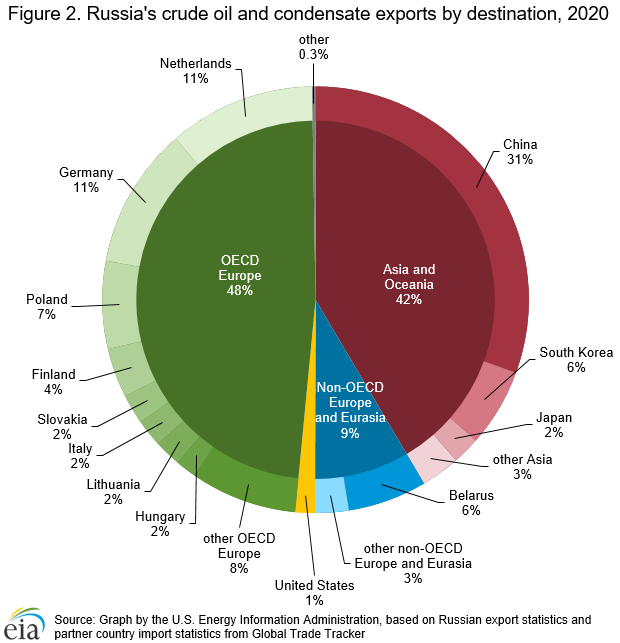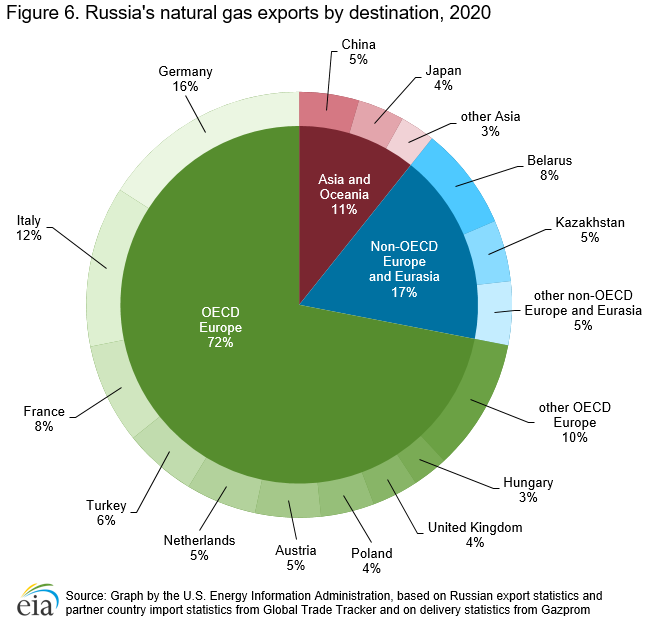Europe’s bad energy policy emboldens Russian aggression in Ukraine
Bloomberg reports that European nations have sleepwalked into an energy crisis that was years in the making. Unfortunately, Europe’s increasing reliance on Russian natural gas emboldens Russian aggression along the Ukrainian border.
Decades of naive energy policy in Europe have resulted in an entire continent that is utterly incapable of providing for itself. Several nations have shut down many of their coal and nuclear power plants, banned fracking for oil and natural gas within their borders, and hoped that wind and solar could fill the void. They cannot.
Each of these decisions has made the European Union less energy secure and more reliant on energy imports from Russia.
According to the U.S. Energy Information Administration, Europe is Russia’s main market for its oil and natural gas exports, and by extension, Europe is its main source of revenues. The graph below shows 57 percent of Russian oil exports are destined to Europe, while only 1 percent is exported to the United States.

Europe is an even larger market for Russian natural gas, with more than 72 percent of Russian exports going to Germany, Italy, France, Turkey, the Netherlands, and other countries.

Europe’s reliance on Russian energy has rendered it hostage to the whims of the Kremlin and essentially helpless to resist Russian aggression in Ukraine. Bloomberg reports:
With energy policy largely in the hands of member states, EU officials lack the authority to compel national governments to replenish gas inventories more quickly. To make matters worse, Russia is building troops on the border with Ukraine, a move U.S. intelligence sources say presages a possible invasion. About a third of Russian gas flowing to Europe crosses Ukraine, and though shipments weren’t disrupted during Russia’s 2014 annexation of Crimea, there’s no guarantee that would remain the case if a war were to break out this year.
The energy situation limits the scope of actions Western powers can take to counter Russian aggression, says Jason Bordoff, director of the Center on Global Energy Policy at Columbia University. “The ability of Europe and the U.S. to respond to a Russian invasion is constrained both by a desire not to exacerbate Europe’s energy crisis by sanctioning Russian energy exports and, more broadly, by the threat that Russia could retaliate to any confrontation by restricting gas flows into Europe, as Russia did in 2006 and 2009,” says Bordoff, a former energy and climate adviser in the Obama administration.
By embracing wind and solar and shutting down reliable nuclear and coal plants, Europe has been setting up the dominoes for an energy disaster. Now, they will suffer the economic consequences of the energy crisis while emboldening and financing Russian military expansionism.
Fairytale-thinking has real, negative consequences. Europe is getting a painful reality check.